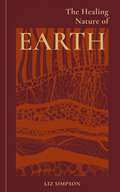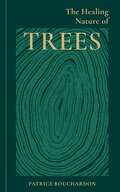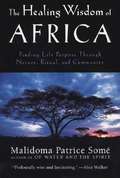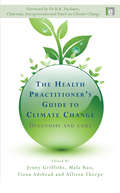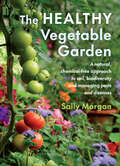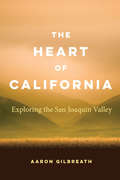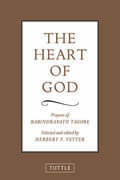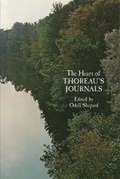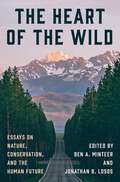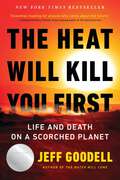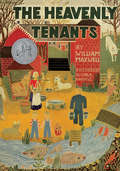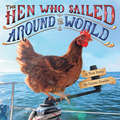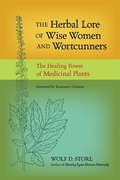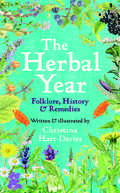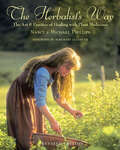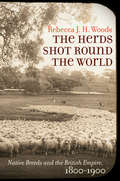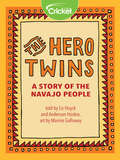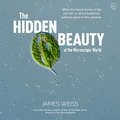- Table View
- List View
The Healing Nature of Earth (The Healing Energies Of)
by Liz AlexanderWhat can be more fundamental to our existence than the Earth itself? Our connection to the planet is encapsulated in the ancient archetype of Earth as the nurturing Great Mother, Gaia - a concept revered by our ancestors who understood the intricate balance between Earth and humanity.The Healing Nature of Earth delves into this timeless relationship, bridging ancient wisdom with contemporary insights into Earth's energies. It explores creation myths and the symbolism of Earth as the benevolent Mother, alongside rituals and beliefs that span cultures and scientific disciplines.This book explains ways to enhance personal well-being - whether mental, physical, or spiritual - empowering us to look toward holistic healing and forging a harmonious path forward for both ourselves and to safeguard the health of our fragile planet. Chapters include:- Earth science- Sacred Earth- Ancient Practices
The Healing Nature of Earth (The Healing Energies Of)
by Liz AlexanderWhat can be more fundamental to our existence than the Earth itself? Our connection to the planet is encapsulated in the ancient archetype of Earth as the nurturing Great Mother, Gaia - a concept revered by our ancestors who understood the intricate balance between Earth and humanity.The Healing Nature of Earth delves into this timeless relationship, bridging ancient wisdom with contemporary insights into Earth's energies. It explores creation myths and the symbolism of Earth as the benevolent Mother, alongside rituals and beliefs that span cultures and scientific disciplines.This book explains ways to enhance personal well-being - whether mental, physical, or spiritual - empowering us to look toward holistic healing and forging a harmonious path forward for both ourselves and to safeguard the health of our fragile planet. Chapters include:- Earth science- Sacred Earth- Ancient Practices
The Healing Nature of Trees
by Patrice BouchardonSince ancient times the tree has been a symbol of power, of wisdom, of fertility and of life itself.Woods and forests provide a special place for finding peace, silence and beauty; precious qualities that are becoming more and more needed to combat the stress of daily life. The Healing Nature of Trees beckons you to pause amidst the bustling world and invites you to meet trees as you never have before, fostering a deeper connection with the natural world, helping you to discover and use trees' energy for yourself and provide a clear process of self-development, self-healing and a creative way of finding new solutions to the problems that face us.Chapters include:- What nature means to us- The healing process- Expanding our perception of trees
The Healing Nature of Trees
by Patrice BouchardonSince ancient times the tree has been a symbol of power, of wisdom, of fertility and of life itself.Woods and forests provide a special place for finding peace, silence and beauty; precious qualities that are becoming more and more needed to combat the stress of daily life. The Healing Nature of Trees beckons you to pause amidst the bustling world and invites you to meet trees as you never have before, fostering a deeper connection with the natural world, helping you to discover and use trees' energy for yourself and provide a clear process of self-development, self-healing and a creative way of finding new solutions to the problems that face us.Chapters include:- What nature means to us- The healing process- Expanding our perception of trees
The Healing Wisdom of Africa: Finding Life Purpose Through Nature, Ritual, and Community
by Malidoma Patrice SoméThrough The Healing Wisdom of Africa, readers can come to understand that the life of indigenous and traditional people is a paradigm for an intimate relationship with the natural world that both surrounds us and is within us. The book is the most complete study of the role ritual plays in the lives of African people--and the role it can play for seekers in the West.
The Health Practitioner's Guide to Climate Change: Diagnosis and Cure
by Jenny Griffiths Fiona Adshead Mala Rao Allison ThorpeHighly commended in the Public Health category, BMA Medical Awards 2010 There are enormous health benefits from tackling climate change. This is the first book to set out what health practitioners can do to prevent the worst impacts of climate change, to make health services sustainable, and to design healthy, sustainable communities. The book: - provides an introduction for health practitioners and students to climate change and its current and future health impacts - describes the relationship between health and the environment - gives facts and figures on greenhouse gas emissions - sets out the huge benefits to health of acting on climate change - explains what health practitioners can do - at home, at work and in their organizations, and - shows how you can support action in communities, nationally and globally. Essential reading for: - health professionals, local government, built environment professionals - students across all sectors of health, medicine and public administration - community and voluntary sector, NGOs - the business community involved in private healthcare. The Health Practitioner's Guide to Climate Change is written by an authoritative group of authors from key organisations in the field, including the Met Office, the Faculty of Public Health, Natural England, the London School of Hygiene and Tropical Medicine, the Climate and Health Council, the NHS Sustainable Development Unit, the Health Protection Agency, the University of the West of England, Sustrans and the National Social Marketing Centre. Sponsored by The National Heart Forum and the National Social Marketing Centre. Foreword by Dr. R.K. Pachauri, Director General, The Energy and Resources Institute (TERI) and Chairman, Intergovernmental Panel on Climate Change (IPCC)
The Healthy Vegetable Garden: A natural, chemical-free approach to soil, biodiversity and managing pests and diseases
by Sally MorganWhether you’re an experienced gardener, homesteader, or market farmer, this A–Z, soil-to-table guide shows you how to reduce chemical inputs; naturally enrich your growing ecology; and create a hardy, nutrient-dense, and delicious crop. "There are few gardeners (or farmers) I know who wouldn’t benefit from reading Sally Morgan’s new book. . . . The Healthy Vegetable Garden is a detailed and indispensable resource."—Hobby Farms In The Healthy Vegetable Garden, expert organic gardener Sally Morgan explains how to use natural approaches to cope with the challenges of a changing climate through principles from regenerative gardening, agroecology, and permaculture—all to help your green space thrive. The Healthy Vegetable Garden shows you how to: Combat disease and keep pests at bay with natural predators, companion planting, and trap and barrier crops Choose the right plants to attract pollinators and pest predators Build a healthy soil full of organic matter, earthworms, and mycorrhizal fungi Regenerate soil through no-dig practices, composting, cover crops, and mulching Boost biodiversity through the use of crop rotations and polyculture Rewild your garden by creating a range of habitats, making use of walls and fences, log piles, water features, and wild corners Understand plant defenses and use biocontrols Make natural barriers, traps, and lures A healthy, productive garden should work in harmony with nature to produce and protect delicious fruits and vegetables and build a rich soil that is full of life. With The Healthy Vegetable Garden, growers of all levels will start reducing incidents of pests and diseases while creating a verdant habitat—all without the need for fertilizers, pesticides, or weedkillers.
The Heart of California: Exploring the San Joaquin Valley
by Aaron GilbreathA vivid journey through California&’s vast rural interior, The Heart of California weaves the story of historian Frank Latta&’s forgotten 1938 boat trip from Bakersfield to San Francisco with Aaron Gilbreath&’s trip retracing Latta&’s route by car during the 2014 drought. Latta embarked on his journey to publicize the need for dams and levees to improve flood control. Gilbreath made his own trip to profile Latta and the productive agricultural world that damming has created in the San Joaquin Valley, to describe the region&’s nearly lost indigenous culture and ecosystems, and to bring this complex yet largely ignored landscape to life. The Valley is home to some of California&’s fastest growing cities and, by some estimates, produces 25 percent of America&’s food. The Valley feeds too many people, and is too unique, to be ignored. To understand California, you have to understand the Valley. Mixing travel writing, historical recreations, western history, natural history, and first-person reportage, The Heart of California is a road-trip narrative about this fascinating region and its most important early documentarian.
The Heart of God
by Rabindranath Tagore Herbert F. VetterAwarded the Noble Prize for Literature in 1913, Rabindranath Tagore (1861-- 1941) is considered the most important poet of modern-day India. He was also a distinguished author, educator, social reformer, and philosopher. Today, Tagore along with Mahatma Gandhi are prized as the foremost intellectual and spiritual advocates of India's liberation from imperial rule.This inspiring collection of Tagore's poetry represent his "simple prayers of common life." Each of the seventy-seven prayers is an eloquent affirmation of the divine in the face of both joy and sorrow. Like the Psalms of David, they transcend time and speak directly to the human heart.
The Heart of Thoreau's Journals
by Odell ShepardThe conflict between scientific observation and poetry, reflections on abolition, transcendental philosophy, other concerns are explored in this superb general selection from Thoreau's voluminous Journal. Here are "...the choicest fruits of Thoreau..." -- Nation.
The Heart of the Wild: Essays on Nature, Conservation, and the Human Future
by Gary Paul Nabhan Peter H. Raven Joel Berger Harry W. Greene Hal Herzog Susan Clayton Emma Marris Kathleen Dean Moore Thomas Lowe Fleischner Eileen Crist Bill Adams Martha L. Crump Christopher J. Schell Richard Shine Kyle WhyteTimely and provocative reflections on the future of the wild in an increasingly human worldThe Heart of the Wild brings together some of today&’s leading scientists, humanists, and nature writers to offer a thought-provoking meditation on the urgency of learning about and experiencing our wild places in an age of rapidly expanding human impacts.These engaging essays present nuanced and often surprising perspectives on the meaning and value of &“wildness&” amid the realities of the Anthropocene. They consider the trends and forces—from the cultural and conceptual to the ecological and technological—that are transforming our relationship with the natural world and sometimes seem only to be pulling us farther away from wild places and species with each passing day. The contributors make impassioned defenses of naturalism, natural history, and nature education in helping us to rediscover a love for the wild at a time when our connections with it have frayed or been lost altogether.Charting a new path forward in an era of ecological uncertainty, The Heart of the Wild reframes our understanding of nature and our responsibility to learn from and sustain it as the human footprint sinks ever deeper into the landscapes around us.With contributions by Bill Adams, Joel Berger, Susan Clayton, Eileen Crist, Martha L. Crump, Thomas Lowe Fleischner, Harry W. Greene, Hal Herzog, Jonathan B. Losos, Emma Marris, Ben A. Minteer, Kathleen Dean Moore, Gary Paul Nabhan, Peter H. Raven, Christopher J. Schell, Richard Shine, and Kyle Whyte.
The Heat Will Kill You First: Life and Death on a Scorched Planet
by Jeff GoodellNew York Times best-selling journalist Jeff Goodell presents a "masterful, bracing" (David Wallace-Wells) examination of the impact that temperature rise will have on our lives and on our planet, offering a vital new perspective on where we are headed, how we can prepare, and what is at stake if we fail to act. &“When heat comes, it&’s invisible. It doesn&’t bend tree branches or blow hair across your face to let you know it&’s arrived…. The sun feels like the barrel of a gun pointed at you.&” The world is waking up to a new reality: wildfires are now seasonal in California, the Northeast is getting less and less snow each winter, and the ice sheets in the Arctic and Antarctica are melting fast. Heat is the first order threat that drives all other impacts of the climate crisis. And as the temperature rises, it is revealing fault lines in our governments, our politics, our economy, and our values. The basic science is not complicated: Stop burning fossil fuels tomorrow, and the global temperature will stop rising tomorrow. Stop burning fossil fuels in 50 years, and the temperature will keep rising for 50 years, making parts of our planet virtually uninhabitable. It&’s up to us. The hotter it gets, the deeper and wider our fault lines will open. The Heat Will Kill You First is about the extreme ways in which our planet is already changing. It is about why spring is coming a few weeks earlier and fall is coming a few weeks later and the impact that will have on everything from our food supply to disease outbreaks. It is about what will happen to our lives and our communities when typical summer days in Chicago or Boston go from 90° F to 110°F. A heatwave, Goodell explains, is a predatory event— one that culls out the most vulnerable people. But that is changing. As heatwaves become more intense and more common, they will become more democratic. As an award-winning journalist who has been at the forefront of environmental journalism for decades, Goodell&’s new book may be his most provocative yet, explaining how extreme heat will dramatically change the world as we know it. Masterfully reported, mixing the latest scientific insight with on-the-ground storytelling, Jeff Goodell tackles the big questions and uncovers how extreme heat is a force beyond anything we have reckoned with before.
The Heavenly Tenants
by William Maxwell Ilonka KaraszThe Marvell family is on the move, driving from their Wisconsin farm to visit the children's grandmother in Virginia. The night before their departure, Mr. Marvell talks to Roger, Heather, and the twins about the wonders of the night sky and explains the zodiac — a beautiful trail traveled by the sun in the daytime and by the moon and planets at night. The pathway's 12 sections, called the "signs" of the zodiac, contain clusters of stars. Long ago shepherds and sailors identified the clusters with characters from mythology, and so the heavens became filled with gods and heroes, hunters, ploughmen, and archers as well as birds, bears, farm animals, and monsters.Upon the family's arrival in Virginia, Mr. Marvell sets up his telescope but he can't find the Crab —it has disappeared from the sky! Meanwhile, back in Wisconsin, a strange light emanates from the Marvells' house, illuminating every board, windowpane, shingle, brick, and stone. What could be causing it?A Newbery Honor book of 1947, this extraordinary tale by a noted American author is gloriously illustrated with woodcut-style scratchboard graphics.
The Hedgehog Diaries: ‘The most poignant and heartwarming memoir of the year’
by Sarah Sands"If you buy one book this year make sure it's this one... Enchanting."Daily Mail"This charming book weaves hedgehogs into our hearts, our lives and our national identity."John WitherowA few days after her elderly father is admitted to hospital, Sarah Sands and her grandson find a poorly hedgehog in the garden. They name her Peggy, and her fate becomes a matter of pressing concern.There is something about hedgehogs - homely and yet mysterious, prickly and defenceless, wild and tame - that makes us feel deeply sympathetic to them.Having managed to outlive roads, dogs, strimmers and pesticides, hedgehogs are now an endangered species. For Sarah Sands, our failure to protect them is a symptom of our alienation from the living world.But all is not yet lost. In this charming book, Sands explores the meaning and morals of hedgehogs, and finds, in hedgehog world, a source of deep solace and wisdom.
The Hedgerow Apothecary Forager's Handbook: A Seasonal Companion to Finding and Gathering Wild Plants
by Christine IversonLearn to forage in the hedgerows like the herbalists of the pastAs many of us look for ways to live a more planet-friendly lifestyle, the sustainable and ethical art of foraging offers us a way to connect with the world around us. It is a practice rich in tradition and steeped in history, and one that links us to our past and our future.This foraging companion is designed to be taken with you on your adventures into the hedgerows, forests and woodland all year round. Helpfully arranged by season, this book includes clear photographs to aid plant identification, ideas on how best to prepare and preserve your finds, fascinating foraging and plant folklore, and handy pages to make your own notes and drawings.Additional features:- A month-by-month foraging calendar- Advice on foraging etiquette and tips for creating a forager's toolkitThis is the essential guide to enjoying the bountiful delights of the hedgerows.
The Hen Who Sailed Around the World: A True Story
by Guirec SoudéeMeet Monique! In this true story, online phenomenon Guirec Soudée shares his adventures both unbelievable and heartwarming, sailing around the world with his brave, affectionate red hen, Monique. Monique is a highly accomplished chicken: she surfs, she skateboards, and she just crossed the world on a tiny boat with her human companion, Guirec, who helped steer. On their three-year journey, together they were unstoppable. When they became stranded in the ice off Greenland for four months, Monique, unruffled as always, kept Guirec alive with her eggs-- and they both made it home. Guirec and Monique are irresistible as unlikely comrades and friends taking on the world, and Guirec documented their journey with his remarkable, comical photographs. A deeply touching portrait of the real-life bond between animals and the humans who love them as well as a thrilling survival story, The Hen Who Sailed Around the World is an adventure for the ages.
The Herb Almanac: A seasonal guide to medicinal plants
by Chelsea Physic GardenA beautiful and accessible seasonal guide to herbalism from the historic botanic garden.Discover the best times of the year for growing specific healing herbs and also when and how to forage for wild medicine, such as water mint, St John's Wort, hawthorn berries and rosehips. Recipes are included for how to use these herbs, along with folklore stories from herb wives and hedge witches, the meanings behind their names and the history of how these natural medicines were discovered.There are plenty of tips for how to create your own medicinal herb garden, even with just a few pots, along with a biodynamic guide for sowing, planting and harvesting. Including detailed hand-drawn line illustrations to help deepen your understanding, The Herb Almanac is the perfect gift for any nature lover.CONTENTS INCLUDES:IntroductionIncluding using herbs as seasonally appropriate remedies and tonics, an overview of herbs in folklore, wild medicine, magic, superstition, ritual, tradition and literature and herbs in religion and floriography (the language of flowers)Gathering and Using HerbsIncluding safe, legal and successful foraging, a brief introduction to growing your own herbs and preparing, drying and preserving herbsWitches' Brews: Poisonous Plants Including an overview of herbs with interesting stories that cannot be easily used, e.g. wormwood, hemlock and mandrakeHerb EncyclopediaIncluding detailed information on over 50 different herbs
The Herb Almanac: A seasonal guide to medicinal plants
by Chelsea Physic GardenA beautiful and accessible seasonal guide to herbalism from the historic botanic garden.Discover the best times of the year for growing specific healing herbs and also when and how to forage for wild medicine, such as water mint, St John's Wort, hawthorn berries and rosehips. Recipes are included for how to use these herbs, along with folklore stories from herb wives and hedge witches, the meanings behind their names and the history of how these natural medicines were discovered.There are plenty of tips for how to create your own medicinal herb garden, even with just a few pots, along with a biodynamic guide for sowing, planting and harvesting. Including detailed hand-drawn line illustrations to help deepen your understanding, The Herb Almanac is the perfect gift for any nature lover.CONTENTS INCLUDES:IntroductionIncluding using herbs as seasonally appropriate remedies and tonics, an overview of herbs in folklore, wild medicine, magic, superstition, ritual, tradition and literature and herbs in religion and floriography (the language of flowers)Gathering and Using HerbsIncluding safe, legal and successful foraging, a brief introduction to growing your own herbs and preparing, drying and preserving herbsWitches' Brews: Poisonous Plants Including an overview of herbs with interesting stories that cannot be easily used, e.g. wormwood, hemlock and mandrakeHerb EncyclopediaIncluding detailed information on over 50 different herbs
The Herb Book: The Most Complete Catalog of Herbs Ever Published
by John Lust"I have an old copy of this book that I've had for years and would never let go of, no matter how many times I moved and thinned out my books. This is a re-release and I'm really happy to see it back in print. Part two of the book is the real treasure. It is an alphabetical list of herbs that gives detailed information about their properties, including any cautions required." — Lora's Rants & ReviewsAlso known as "The Natural Remedy Bible," The Herb Book provides a comprehensive resource for building a livelier, healthier, happier life. More than 2,000 listings offer remedies for ragged nerves, nightmares, and coughing fits as well as suggestions for adding spice to recipes, coloring fabrics, freshening breath, and a host of other benefits. Complete and concise descriptions of herbs, illustrated by more than 275 line drawings, offer the most comprehensive catalog of "miracle plants" ever published. Written by an expert and pioneer in the field, this easy-to-use reference features three parts. The first presents introductory historical information and background for using the rest of the book. The second part features individual numbered listings of medicinal plants with their botanical descriptions and uses. The third part emphasizes the variety of uses for the plants listed in Part 2, including mixtures for medicinal treatments, nutritious and culinary plants, cosmetic and aromatic purposes, plant dyes, and other applications. The book concludes with a captivating look at plant-related astrology, lore, and legends.
The Herbal Lore of Wise Women and Wortcunners
by Rosemary Gladstar Wolf D. StorlTraditional herbalists or wise women were not only good botanists or pharmacologists; they were also shamanic practitioners and keepers of occult knowledge about the powerful properties of plants. Traveling back to the healing arts of the ancient Egyptians, Greeks, and Romans, The Herbal Lore of Wise Women and Wortcunners takes readers deep into this world, through the leechcraft of heathen society and witches' herb bundles to the cloister gardens of the Middle Ages. It also examines herbal medicine today in the traditional Chinese apothecary, the Indian ayurvedic system, homeopathy, and Native American medicine. Balancing the mystical with the practical, author Wolf Storl explains how to become an herbalist, from collecting material to distilling and administering medicines. He includes authoritative advice on herb gardening, as well as a holistic inventory of plants used for purposes both benign and malign, from herbs for cooking, healing, beauty, and body care to psychedelic plants, witches' salves for opening alternative realities, and poisonous herbs that can induce madness or cause death. Storl also describes traditional "women's plants" and their uses: dyeing cloth, spinning and weaving, or whipping up love potions. The Herbal Lore of Wise Women and Wortcunners is written for professional and amateur herbalists as well as gardeners, urban homesteaders, and plantspeople interested in these rich ancient traditions.
The Herbal Year: Folklore, History and Remedies
by Christina Hart-DaviesAn enchanting, beautifully illustrated guide to seasonal plants—showing the long history of herbal remedies and their uses today“[A] charming almanac. . . . Hart-Davies, a writer and botanical illustrator whose watercolors enliven her book, . . . offers a lively combination of folk history and modern science; they overlap in intriguing ways.”—Priscilla M. Jensen, Wall Street Journal From sweet violets in spring to rosemary in winter, via marigolds, sage, elderberries, and hops, every season has its own bounty of herbs and plants. Christina Hart-Davies presents a delightful guide to common plants as they appear throughout the year. Drawing on writers, storytellers, and poets from across the centuries, she examines the long history of herbal remedies. She shows how plants have been used for healing and unearths the stories and beliefs that surround them—including simple recipes for use at home. Fully illustrated with exquisitely detailed watercolours, this is an inspirational guide to exploring our age-old relationship with plants. Readers will discover the hidden secrets of the plants that surround us and, through this, will be able to reconnect with our place in nature. We have relied on plants throughout our history. We still do, and, with luck, we always will.
The Herbalist's Way: The Art and Practice of Healing with Plant Medicines
by Michael Phillips Nancy PhillipsThis updated edition of The Village Herbalist provides a complete guide to the art and practice of herbalism, as well as an introduction to the herbalist&’s role in family and community life. Inspirational profiles of practicing herbalists from across the country add a human touch to the authors&’ wealth of practical herbal knowledge.The Herbalist&’s Way includes time-honored healing wisdom from many cultures, as well as information on:• Roles and responsibilities of herbalists in their communities• Herbal workshops, conferences, and education centers• Growing, drying, and preparing medicinal herbs• Learning to listen to clients and recommend holistic treatments for healing and continued wellness• Licensing, marketing, and other legal and business issues facing modern herbalists• Comprehensive resources and suggestions for building your herbal library
The Herds Shot Round the World: Native Breeds and the British Empire, 1800–1900 (Flows, Migrations, and Exchanges)
by Rebecca J. WoodsAs Britain industrialized in the early nineteenth century, animal breeders faced the need to convert livestock into products while maintaining the distinctive character of their breeds. Thus they transformed cattle and sheep adapted to regional environments into bulky, quick-fattening beasts. Exploring the environmental and economic ramifications of imperial expansion on colonial environments and production practices, Rebecca J. H. Woods traces how global physiological and ecological diversity eroded under the technological, economic, and cultural system that grew up around the production of livestock by the British Empire. Attending to the relationship between type and place and what it means to call a particular breed of livestock "native," Woods highlights the inherent tension between consumer expectations in the metropole and the ecological reality at the periphery.Based on extensive archival work in the United Kingdom, New Zealand, and Australia, this study illuminates the connections between the biological consequences and the politics of imperialism. In tracing both the national origins and imperial expansion of British breeds, Woods uncovers the processes that laid the foundation for our livestock industry today.
The Hero Twins: A Story of the Navajo People
by Liz Huyck Anderson HoskieTwins have twice the adventure as they must prove themselves, facing danger and monsters in this cartoon based on a Navajo origin myth. The twins fight for peace, aiming to rid the world of monsters such as poverty and hunger. So why do we still have poverty and hunger?
The Hidden Beauty of the Microscopic World: What the tiniest forms of life can tells us about existence and our place in the universe
by James WeissThe videographer behind the Journey to the Microcosmos YouTube channel (386K subscribers) James Weiss presents a beginner's guide to the extremely small and utterly strange life that surrounds us.James Weiss was feeling lost in life when he first discovered his interest in the microscopic world. With his own microscope and a little homespun ingenuity, he began to capture thousands of hours of stunning footage of the creatures that he found around him: the local pond, at the beach, in a puddle. What he found astounded him, and it became his mission to reveal the beauty of the microcosmos to everyone.In his fun and accessible style, interspersed with otherworldly photographs, James presents this beginner's guide to the invisible life that surrounds us. From the most simple single-celled life, to complex micro-animals, James reveals the secrets of a world that we rarely consider. Navigating the births, feasts, tragedies, idiosyncracies and deaths of a cast of tiny characters, learn how these lifeforms work and what lessons they can teach us about our own existence. Mixing scientific detail with thoughtful musings that betray the fascination at the heart of his topic, James has created a way of looking at microorganisms in an empathetic and engaging style.You'll discover fascinating absurdities: that a cell can be both its own daughter and its own mother. That immortality really does exist, and it comes in the form of a teeny, tentacled medusa. And that seeing the wonder of nature from a new perspective can literally save your life.
